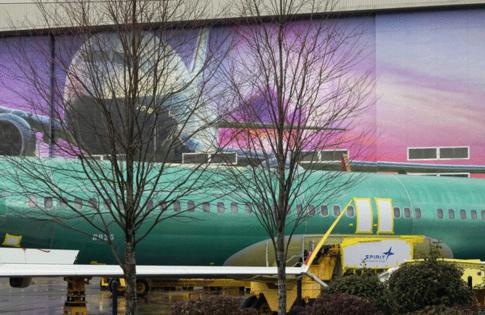Boeing relents in fight over nonunion work, reinstates laid-off engineers
Published in Business News
Boeing has reinstated dozens of laid-off Washington workers who, the engineering union alleged, were in the same roles as nonunion workers but spared from the widespread job cuts.
The Society of Professional Engineering Employees in Aerospace, better known as SPEEA, the union that represents engineers and technical workers at Boeing, had earlier this year complained that the company’s layoffs last fall may have violated the union's contract with Boeing.
Boeing announced the cuts in October, with CEO Kelly Ortberg telling employees the company planned to trim 10% of its workforce to cut costs and focus resources on the core parts of its business. Boeing was at the time reeling from the fallout of the Alaska Airlines panel blowout in January 2024, as well as the financial toll of costly defense contracts and a Machinists union strike that halted work in its Puget Sound factories.
The cuts ultimately affected about 2,600 employees in Washington, according to notices filed with the state’s Employment Security Department.
Since then, SPEEA has accused Boeing of violating its contract by retaining some nonunion workers but firing unionized employees in the same types of roles. That goes against the union's collective bargaining agreement, which requires Boeing to first lay off contractors and other nonunion workers before union members, part of the union's overall mission to protect members' jobs.
SPEEA told its members last week Boeing had agreed to reinstate 58 union members, as well as pay back wages for those employees, compensate them for lost benefits and strike the layoff from their employment records.
The decision is a victory for the union but affects only a small percentage of the 600 SPEEA members who lost their jobs in the widespread cuts that took effect in January and February.
Boeing declined to comment on the reinstatement of SPEEA members.
Having a mix of union and nonunion workers performing the same types of jobs is unusual, said Rich Plunkett, SPEEA's director of strategic development. But SPEEA came to an agreement with Boeing decades ago to allow some nonunionized workers to perform union work in order to keep up with the ebb and flow of the industry, and ensure the company had a skilled workforce, Plunkett continued.
Over the years, Boeing has allowed the system for tracking and communicating the use of nonunion work to degrade, Plunkett said in an interview Tuesday, leaving the union concerned about how that agreement is followed.
In January, SPEEA accused Boeing of failing to disclose that it was using a certain kind of “non-Boeing Labor” known as “Industry Assist,” according to the email SPEEA sent to members.
Furthermore, Boeing had laid off some unionized employees but retained Industry Assist workers who were performing the same types of jobs, SPEEA alleged.
SPEEA initially filed a formal complaint against the company and requested arbitration over the alleged contract violations related to the layoffs. After Boeing declined to share a document about the “Industry Assist” employees, SPEEA told the company it planned to file a legal action with the National Labor Relations Board, according to the union.
Boeing initially pushed back but later changed its tone and began collaborating with the union, Plunkett said in the interview Tuesday.
Company executives, including Ortberg, met with SPEEA’s board to hear more about the situation and work to ensure it did not happen again, Plunkett said.
“It appears finally something has shifted and there’s at least an appetite to see if we can work together,” Plunkett said, adding that he saw the series of meetings with Boeing executives as “hopefully demonstrative of the new Ortberg era.”
After the collaboration of the last few months, Plunkett has renewed optimism the union and Boeing leadership can return to the original intent of the agreement to allow nonunion and non-Boeing workers alongside employees, which, Plunkett said, was “balancing the workforce today with the workforce of tomorrow.”
SPEEA’s contracts for its Puget Sound units expire October 2026. In the meantime, it is gearing up for negotiations this fall with Boeing supplier Spirit AeroSystems, based in Wichita, Kan.
Boeing is set to reacquire Spirit, bringing the company back in its fold after spinning it out nearly 20 years ago, in an effort to improve production quality. But that deal is still subject to regulatory approval. This week, the U.K.’s antitrust watchdog said it was considering investigating the acquisition.
©2025 The Seattle Times. Visit seattletimes.com. Distributed by Tribune Content Agency, LLC.












Comments